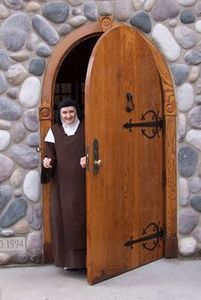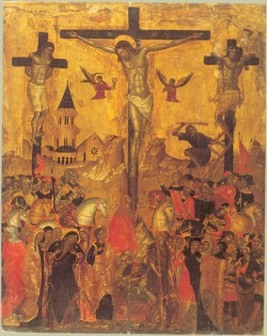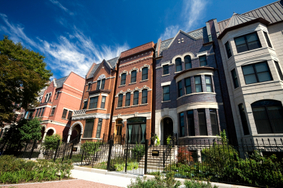The “prior”, or the one the “prior” designates, is to greet all who come to the door.

We may not think about this much, but if the life of an entire community of brothers and sisters can be disrupted if the Prior is not attentive to greeting all those who approach, then the same can be said for any home. Who is it that answers the door when the mailman arrives, or the plumber, or a local political activist, or a child, or a complete stranger?
As a child I was told that my parents were always to open the door, even if it was for one of my friends whom I was expecting. But I have a sense today, from the homes and families that I’ve visited, that a lot of people no longer have this rule. Maybe it is a matter of protecting the safety of our children, in case that very rare event happens and a complete stranger with mal-intent is knocking at the door. Then, we may also consider the more general and broad question: What good would it do for a parent to always greet whoever approaches the home? If it is an adult, the mailman, a repairman or one of the neighbors who comes to the door, then most likely the parent would be needed anyway, as would the Prior. If a child is knocking at the door, a friend of your own child, then you would know who was coming over and who your child was spending their time with. Then we may consider school nights or family nights, or times when chores are being done? Is it easier for a parent or for a child to say, “Sorry, I can’t go out, I’ve got homework to do?” If the parent, who is the prior of the house, is the one to greet everyone who comes to the door, then they are not only better suited to meet the needs of all who come, but also, to care for the needs of everyone in the house. If you are thinking it may all be about control, do you remember any times as a child when that annoying kid kept coming over? Just as a Prior is called to play interference and protect the brothers from intrusions, so too is the parent the one who gives their children that time in their home to be free to play, or read or otherwise have their time without uninvited intrusions.
In looking at the Rule in this digital age, we may also bear in mind that the door is not the only way that people come into our homes. When the hermits lived on Mt. Carmel, there was a clear and distinct entrance to the wadi. One of the last remaining structures that is still standing is the very archway through which any visitors would have had to pass through. Access to the community was very narrow and easy to protect. Access to our homes and even into our bedrooms is not so simple. Computers and cell phones place social networks at our fingertips, as well as contact with virtually anyone in the world, and almost anything can be accessed from our desktop without anyone else being aware. Cell phones have even replaced the family telephone so tat we are free to text from anywhere, from any room, while we are standing in line at the supermarket, sitting down at dinner, or even while driving. There is much more access to our life than simply through a physical doorway.
It would be no surprise then to suggest to parents that they place a family computer in a public place. We have heard this often suggested as a way to provide safety and security, so that a parent, or even a sibling, could easily check who a child is chatting with and discourage them from visiting websites they would not want others to see. A question, however, is: Is this something that is beneficial to only parents and children?
One of the central traits of this Way of Life is the renunciation of ownership, and once again, the preservation of our cell. Place your computer in a public space--if it is a laptop or tablet, refrain from using it in your private room--and if possible, share it with others (you can use different usernames and passwords so that everyone’s information and projects are protected. Taking this step is not so much in order for the prior, or others to keep tabs on you, but that you may protect access to your cell, to your private space and your time of prayer, that you may give better attention to the interior life--much like the prior would keep watch over the entrance. This step would also give us practice with the renunciation of ownership, which is also and always beneficial. For families, this once again allows parents to “protect” the entrance to the home while pulling the entrance to our inner life away from our pockets.
One may also consider the possibility of retaining, or placing back, a landline phone that is used as the family phone. Another option, however, if this seems excessive, costly or fundamentally impractical, is to designate a common place for each person to place their cell phone when they enter your home, such as in a basket, on a shelf or even on a tabletop, and also designate places and rooms where people may talk on the phone. Not only does this also protect the sanctity of our bedrooms and cells, but it will also limit conversations in other rooms, at the dinner table or wherever it may distract others who are reading, watching television or having conversations with one another.
We should keep in mind that what is important and meaningful is that we recognize that technology and our culture today gives us access to others that no longer requires a doorway, such that if we are to sanctify and value our time in prayer and the silence of certain times, you need to protect these entrances so that the needs of all those in your care are met and that we also remain vigilant against what we allow to gain entry.
As a child I was told that my parents were always to open the door, even if it was for one of my friends whom I was expecting. But I have a sense today, from the homes and families that I’ve visited, that a lot of people no longer have this rule. Maybe it is a matter of protecting the safety of our children, in case that very rare event happens and a complete stranger with mal-intent is knocking at the door. Then, we may also consider the more general and broad question: What good would it do for a parent to always greet whoever approaches the home? If it is an adult, the mailman, a repairman or one of the neighbors who comes to the door, then most likely the parent would be needed anyway, as would the Prior. If a child is knocking at the door, a friend of your own child, then you would know who was coming over and who your child was spending their time with. Then we may consider school nights or family nights, or times when chores are being done? Is it easier for a parent or for a child to say, “Sorry, I can’t go out, I’ve got homework to do?” If the parent, who is the prior of the house, is the one to greet everyone who comes to the door, then they are not only better suited to meet the needs of all who come, but also, to care for the needs of everyone in the house. If you are thinking it may all be about control, do you remember any times as a child when that annoying kid kept coming over? Just as a Prior is called to play interference and protect the brothers from intrusions, so too is the parent the one who gives their children that time in their home to be free to play, or read or otherwise have their time without uninvited intrusions.
In looking at the Rule in this digital age, we may also bear in mind that the door is not the only way that people come into our homes. When the hermits lived on Mt. Carmel, there was a clear and distinct entrance to the wadi. One of the last remaining structures that is still standing is the very archway through which any visitors would have had to pass through. Access to the community was very narrow and easy to protect. Access to our homes and even into our bedrooms is not so simple. Computers and cell phones place social networks at our fingertips, as well as contact with virtually anyone in the world, and almost anything can be accessed from our desktop without anyone else being aware. Cell phones have even replaced the family telephone so tat we are free to text from anywhere, from any room, while we are standing in line at the supermarket, sitting down at dinner, or even while driving. There is much more access to our life than simply through a physical doorway.
It would be no surprise then to suggest to parents that they place a family computer in a public place. We have heard this often suggested as a way to provide safety and security, so that a parent, or even a sibling, could easily check who a child is chatting with and discourage them from visiting websites they would not want others to see. A question, however, is: Is this something that is beneficial to only parents and children?
One of the central traits of this Way of Life is the renunciation of ownership, and once again, the preservation of our cell. Place your computer in a public space--if it is a laptop or tablet, refrain from using it in your private room--and if possible, share it with others (you can use different usernames and passwords so that everyone’s information and projects are protected. Taking this step is not so much in order for the prior, or others to keep tabs on you, but that you may protect access to your cell, to your private space and your time of prayer, that you may give better attention to the interior life--much like the prior would keep watch over the entrance. This step would also give us practice with the renunciation of ownership, which is also and always beneficial. For families, this once again allows parents to “protect” the entrance to the home while pulling the entrance to our inner life away from our pockets.
One may also consider the possibility of retaining, or placing back, a landline phone that is used as the family phone. Another option, however, if this seems excessive, costly or fundamentally impractical, is to designate a common place for each person to place their cell phone when they enter your home, such as in a basket, on a shelf or even on a tabletop, and also designate places and rooms where people may talk on the phone. Not only does this also protect the sanctity of our bedrooms and cells, but it will also limit conversations in other rooms, at the dinner table or wherever it may distract others who are reading, watching television or having conversations with one another.
We should keep in mind that what is important and meaningful is that we recognize that technology and our culture today gives us access to others that no longer requires a doorway, such that if we are to sanctify and value our time in prayer and the silence of certain times, you need to protect these entrances so that the needs of all those in your care are met and that we also remain vigilant against what we allow to gain entry.




 RSS Feed
RSS Feed